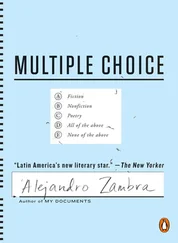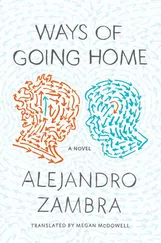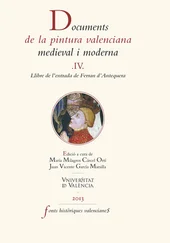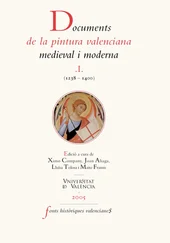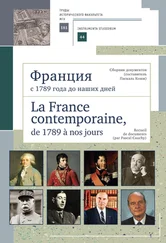The classes at the technical training institute, meanwhile, improved. I started to use my glasses so that I could pay more attention to Pamela. A pair of dimples insinuated themselves into her cheeks, and the way she did her makeup was odd: she drew a too-thick line around her eyes, as if fencing them in, as if she wanted to keep them from jumping out of her skull and escaping. One night we had to go over the various kinds of letter-writing, and I rambled on ineloquently until I had the idea to give them an exercise. I asked them to write a letter that they would have liked to receive, a letter that would have changed their lives. Almost all of them did predictable things, but there were four who took the exercise to its extremes and wrote texts that were savage, devastating, beautiful. One of them, as he read his letter aloud, ended up crying and cursing his father, or his uncle, or a father who was really his uncle — I think we were all uncertain on that point, but we didn’t dare ask him to clarify.
I saw that moment as my chance to change the course of things. I devoted the next few classes to lessons on letter writing, always trying to get them to discover the power of language, the ability of words to influence reality. Some of the students were still uneasy, but we started to have a good time. They wrote to their parents, to childhood friends, to their first loves. I remember one student who wrote to John Paul II to explain why she no longer believed in God (her letter prompted a horrible and convoluted fight that almost came to blows, but in the end we were all better for it). By now they liked the class: the only thing they wanted to do was write letters, express feelings, explore what was happening to them — except for Pamela, who avoided me and abstained from class participation. And, despite my best efforts, we hadn’t run into each other in the metro again.
One night, at the beginning of class, a student raised his hand and told me that he wanted to write a letter of resignation because he was planning to quit his job. He started talking, then, about the problems he had with his boss; I tried to give him advice, but I was possibly the least qualified person in the room to do that. Someone told him he was irresponsible, that before quitting he should think about how he was going to live and how he would pay for school. A weighty and serious silence followed, which I didn’t know how to fill.
“I want to write the letter,” he told us then. “I’m not going to quit, I couldn’t, I have kids, I have problems, but I still want to write that letter. I want to imagine what it would be like to quit. I want to tell my boss how I really feel about him. I want to tell him he’s a son of a bitch, but without using that word.”
“It’s not a word, it’s several,” said a student sitting in the first row.
“What?”
“It’s four words: son of a bitch.”
We started on the letter. We wrote the first paragraphs on the board, but because the class period was coming to an end, we agreed to pick up the exercise next time.
Only there wasn’t a next time. I arrived on Monday just early enough to pick up the folder and go to the classroom, but the building was boarded up and there was even fresh paint on the facade. The institute no longer existed. The students explained all this to me, devastated. They had already paid their tuition that month, and a few had even paid the whole year in advance, taking advantage of a discount.
That night I went with my students to a bar on Avenida España. They didn’t usually go out together and they’d never become friends, so while some of them spoke about their lives and got to know each other, the rest just focused on their beers and churrasco sandwiches. Pamela was at the opposite end of the table, with another group, and never talked to me, but I timed things so that, after leaving the bar, we met on the way to the metro. I went with her again to the bus in Plaza Italia, and when we said good-bye she told me that she felt overly watched by me, but that if I didn’t look at her so much, maybe she would start to like me. “But we’re never going to see each other again,” I told her. “Who knows,” she replied.
The sessions with Juan Emilio weren’t as easy as I’d thought they’d be. He didn’t question the books I chose, but he tried to extract messages and morals from them — as most people do, it must be said. Every week I gave him an exercise to do at home, and he always arrived with a bottle of wine in apology: “I didn’t get to finish my homework,” he’d tell me, with a sort of mischievous gesture, and then off he would go, talking with a dizzying erudition about the vintage or the vineyard of the wine he’d brought, using that language that seemed as funny to me as literary terminology must have seemed to him. Juan Emilio was an executive of something, but I chose not to delve too deeply into his work, basically for the same reason I chose not to ask him what he thought about Pinochet’s return: I didn’t want to find out that he was a bloodsucking tycoon or anything like that — I didn’t want to have any reason to despise him.
On the other hand, I came to know a lot about his family: I started to really take an interest in his children’s lives, which were in no way interesting. From our conversations I deduced that his marriage was complex but stable; I’m sure there had been infidelities, but he and his wife were too old by then to separate, and maybe they lived in that world where people don’t separate even if they hate each other. But Juan Emilio didn’t hate his wife (who had a terrible but, to me, literary-sounding name: Eduviges), nor did she hate him. They seemed to tolerate each other, and maybe every once in a while she waited for him with a pisco sour in hand, and they sat on the sofa to talk about the fates of other, less-fortunate couples, about how good they themselves had it, together and happy after all this time.
It was hard for me to interrupt his speeches to redirect the conversation; in fact, a couple of times it got too late and he had to go before we’d even started the class. In any case, he paid me, of course.
I tried to help my ex-students with their complaint before the Ministry of Education, which offered them little or nothing. We wrote, among all of us, the Big Letter, the crucial missive that would demonstrate the importance of written communication, the power of words, but nothing happened. We had compiled testimonies, the opinions of politicians and of experts in education, but it was all to no avail. The situation was scandalous, and for a time it was in the news, but all of a sudden that silence set in, so suspicious and Chilean, which shrouded everything back then. Some of the students managed to enroll in other institutes, under conditions that were never advantageous, but the ones who had paid for the whole year never found a real solution. And neither did I, I should say: I was owed a month’s salary, but when I tried to join together with the other teachers, I had no luck. I got in touch with two, in fact, who chose not to complain, because they also worked at other institutes, and they didn’t want to come off as troublemakers.
In any case, I resolved to see the class through, meeting at that same bar on Avenida España every week. Of the thirty-five original students, ten of them continued with me through the rest of the semester, every Wednesday, and although a couple of times the thing degenerated, we spent most of those sessions working and discussing. One of those nights, after I had lost all hope, Pamela appeared and joined the group without comment, as if it were the most natural thing in the world. We left together for the metro, and she handed me a five-thousand-peso bill. I told her that the class was free, that at most I would let the students buy me a beer and a sandwich during class. She said that she wanted to pay me anyway, and she wouldn’t take the money back. “Let’s go to your house, Professor,” she said to me then, using the formal usted . She always used usted with me and I almost don’t have to explain how absurd it was for her to do that, since she was ten years older. It was later than usual; I was in the habit of going home and eating a can of tuna before heading to the insurance office, but that night I didn’t have much leeway. I decided to risk it, and I brought her to the office. She sucked me off on the rug and then we had sex on Portillo’s desk, and luckily the phone didn’t ring. At three in the morning a taxi came, which I charged to the company. Before she left, she told me, with exquisite seriousness: “Pay me, Professor, it’s five thousand pesos.” It became, then, a routine: she came to classes and paid, but then, at the office or at my house, I paid her. And always, even in the middle of sex, she used usted with me.
Читать дальше

